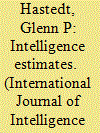| Srl | Item |
| 1 |
ID:
116172


|
|
|
|
|
| Publication |
2012.
|
| Summary/Abstract |
This article addresses the challenge of managing uncertainty when producing estimative intelligence. Much of the theory and practice of estimative intelligence aims to eliminate or reduce uncertainty, but this is often impossible or infeasible. This article instead argues that the goal of estimative intelligence should be to assess uncertainty. By drawing on a body of nearly 400 declassified National Intelligence Estimates as well as prominent texts on analytic tradecraft, this article argues that current tradecraft methods attempt to eliminate uncertainty in ways that can impede the accuracy, clarity, and utility of estimative intelligence. By contrast, a focus on assessing uncertainty suggests solutions to these problems and provides a promising analytic framework for thinking about estimative intelligence in general.
|
|
|
|
|
|
|
|
|
|
|
|
|
|
|
|
| 2 |
ID:
166775


|
|
|
|
|
| Summary/Abstract |
National Intelligence Estimates are consensus-driven intelligence products. Yet there is considerable evidence supporting the use of competitive intelligence at every level of activity, including the presentation of finished products to consumers. We examine NIEs from two important periods in US foreign policy: the buildup in Vietnam and Gorbachev's reforms. We find in both cases alternate viewpoints were not presented in the US IC's premier intelligence product when such views could have made a difference. Consistent with contemporary findings in cognitive psychology, we argue the manner in which NIEs are structured and presented should be reformed to offer better decision support.
|
|
|
|
|
|
|
|
|
|
|
|
|
|
|
|
| 3 |
ID:
094080


|
|
|
|
|
| Publication |
2010.
|
| Summary/Abstract |
From their earliest days National Intelligence Estimates (NIEs) have had a special, albeit controversial, place in the study of the United States Intelligence Community's analytical products. In its broadest terms, the debate over the significance of NIEs is marked alternately by the Council on Foreign Relations identification of NIEs as the "most authoritative written judgments concerning national security issues,"1 and by the judgment of a panel headed by former Central Intelligence Agency official Richard Kerr-known as the Kerr Group-which concluded in 2004, after looking at intelligence on Iraq, that "historically, with few exceptions, NIEs have not carried great weight in policy deliberations.
|
|
|
|
|
|
|
|
|
|
|
|
|
|
|
|